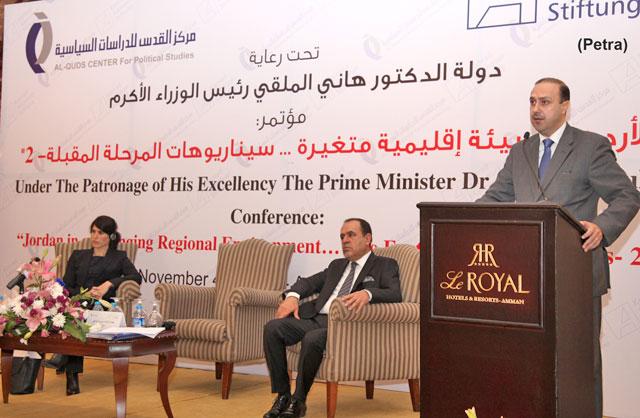You are here
Internal consensus required to revive civil democratic movement, activists say
By Dana Al Emam - Nov 26,2016 - Last updated at Nov 26,2016
AMMAN — A revival of an active and systematic civil democratic current could enhance political activism, but first, an internal consensus on identity and national goals must be reached, activists agreed.
Oraib Rantawi, the director of Al Quds Centre for Political Studies, said there are three main components of the civil current: the civil democratic movement, the nationalist leftist movement and the conservative movement with religious reference, such as the National Building Initiative (Zamzam).
He noted that the first, which is the closest to the civil state values, has failed over the past years, a matter that allowed the growth of the third, citing an “ideological decline” and duplicity on several political issues in the region among the leftist movement.
Speaking at a workshop organised on Saturday by Al Quds Centre and Konrad Adenauer Stiftung, Rantawi said that many leftists who criticise Islamists for not renewing their discourse do not generally seek to develop the leftist and Marxist discourse to address current social and political conditions.
But first and foremost, the civil democratic current has to identify what it stands for, while engaging the younger generation, women and civil society organisations, and moving towards building coalitions and partnerships with movements carrying other ideologies, he explained.
Former deputy Mustafa Hamarneh, who led the 17th parliament’s “Mubadara” group, noted that the civil democratic current’s relation with authority must be redefined, to ensure the current’s engagement as a partner, not as an arm for the authorities.
In addition, he called for redefining the relationship between the individual and the state under a “manifesto” that highlights commonalities and overcomes differences.
The current has a bigger chance for representation in the upcoming municipalities and governorate council elections, Rantawi noted.
MP Khaled Ramadan, who represents a list that promotes civil democratic thought, said civil democratic ideology is not represented in a political current, but among “elites” who try to spread enlightened thought “on separate islands”.
Holders of this ideology face great difficulties in expressing their views freely without social and tribal pressures, Ramadan argued.
Meanwhile, he said the term civil state carries a variety of meanings, yet all interpretations are not very popular and often clash with authorities and political Islamic movements.
“It is a shortcoming that the civil democratic current and the civil state is a political project against the Islamic movement,” he said at the event.
Former deputy Jamil Nimri said the aim is not to create a political party or a political front, but a current with an “extremely open and flexible work plan” that excludes personal interests and considerations.
Resident Representative of Konrad Adenauer Stiftung Manuel Schubert said the elections for the 18th Parliament were a chance for representatives of the civil democratic current to compete against the dominant tribal and business-oriented wings.
He added that the success of some deputies holding this ideology, including Maan list in Amman’s 3rd District, indicates that voters, especially younger ones, support this vision.
Related Articles
AMMAN — Amending the by-law governing political party financing to become based on representation and performance in local councils and parl
AMMAN — Despite several similarities between the political outlooks in Jordan and Morocco, Moroccan political parties have succeeded in form
AMMAN — Jordan’s strategy to fight terrorism is based on an approach combining military, security and ideology, an official said on Saturday












